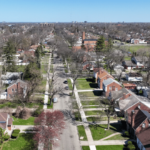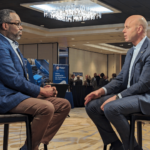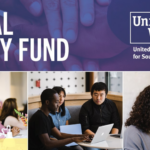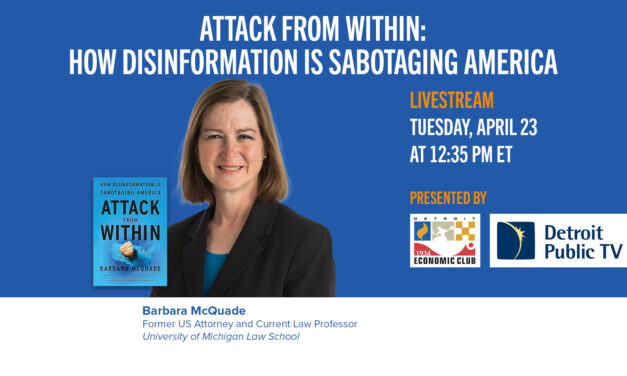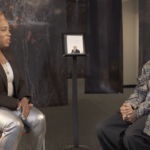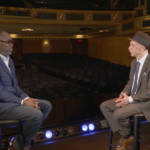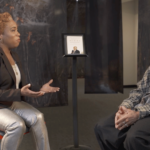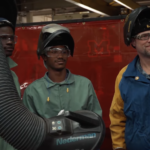- News
- Art & Culture
- Neighborhoods
- Business
- Education
- Politics
- People
- Environment
- Health
- History
Detroit Public TV changes name to Detroit PBS, plans to return headquarters to the city
Apr 19, 2024
One Detroit Producer Will Glover talks with Detroit PBS President and CEO Rich Homberg and Detroit PBS CFO/COO Ollette Boyd about the excitement surrounding the TV station’s new name and new location in Detroit. They share their vision for the new headquarters and discuss plans to expand programming, foster partnerships with local organizations, and provide resources to underserved communities.
2024 Detroit Jazz Festival artist-in-residence Brian Blade and The Fellowship Band perform
Apr 17, 2024
The Detroit Jazz Festival Foundation has announced acclaimed drummer, composer, and bandleader Brian Blade as the artist-in-residence for this year’s Labor Day weekend festival. As part of his residency, Brian Blade and The Fellowship Band performed during a special preview event at the Gretchen C. Valade Jazz Center at Wayne State University. Watch a portion of Blade’s performance.
Wayne State University’s AI for Mobility Project seeks to improve Detroit’s public transit system
Mar 29, 2024
The Wayne State University School of Computer Science is working on an AI tool that may transform the way Detroiters get around the city. The goal of the tool is to increase the availability and reliability of Detroit’s public transit system. Producer Will Glover talks with Dr. Dongxiao Zhu, the founding director of the AI research initiative, and his team about their AI for Mobility Project.
Detroit Public TV changes name to Detroit PBS, plans to return headquarters to the city
Apr 19, 2024
One Detroit Producer Will Glover talks with Detroit PBS President and CEO Rich Homberg and Detroit PBS CFO/COO Ollette Boyd about the excitement surrounding the TV station’s new name and new location in Detroit. They share their vision for the new headquarters and discuss plans to expand programming, foster partnerships with local organizations, and provide resources to underserved communities.
Birdie’s Bookmobile spreads the joy of reading to Detroit children
Apr 19, 2024
Birdie’s Bookmobile hopes to inspire the next generation of readers. Launched in 2022, the literacy organization provides hundreds of books to schools, after-school programs and nonprofits across Detroit. Since Birdie’s Bookmobile was born, it has distributed more than 16,000 books. One Detroit and BridgeDetroit contributor Eleanore Catolico has the story.
“Attack from Within: How Disinformation is Sabotaging America” with former U.S. Attorney Barbara McQuade
Apr 17, 2024
Legal scholar and analyst Barbara McQuade, a former United States attorney and current law professor at the University of Michigan, joins Michigan Secretary of State Jocelyn Benson at the Detroit Economic Club to discuss her book "Attack from Within," how to identify disinformation and how you can fight against it.
“Attack from Within: How Disinformation is Sabotaging America” with former U.S. Attorney Barbara McQuade
Apr 17, 2024
Legal scholar and analyst Barbara McQuade, a former United States attorney and current law professor at the University of Michigan, joins Michigan Secretary of State Jocelyn Benson at the Detroit Economic Club to discuss her book "Attack from Within," how to identify disinformation and how you can fight against it.
Detroit City Council member calls for moratorium on new dollar stores after excessive blight
Dec 7, 2023
Overgrown weeds, empty bottles and discarded bags littered property around a Detroit Family Dollar store. This type of blight isn’t unusual for a number of the dollar stores across the city. One Detroit’s Will Glover talks with BridgeDetroit reporter Jena Brooker about the blight issues at dollar stores around the city, as well as steps city officials are taking.
New data released by EHproject shows Black women are at higher risk for heart disease
Feb 20, 2024
New data from the medical team at EHproject show African American women are at a greater risk for heart disease than their white counterparts. For American Heart Month, Henry Ford Health Cardiologist Dr. Brittany Fuller talks about the high rate of heart disease among Black women. Plus, she provides some helpful advice on what women can do to reduce their risk factors.
Zekelman Holocaust Center re-opens newly renovated exhibit now focused on local survivor stories
Feb 16, 2024
The Zekelman Holocaust Center has opened its newly renovated core exhibit, which now puts Holocaust survivors’ and victims’ stories at the forefront. The exhibition uses new technology and updated historical information to recount their memories and honor their legacy. One Detroit’s Sarah Zientarski attended the opening ceremony to learn about the changes.
ONE DETROIT EPISODES
Duggan State of the City, Detroit PBS, Birdie’s Bookmobile, Outdoor Adventure Center | One Detroit
Apr 19, 2024
Contributors Stephen Henderson, Nolan Finley and Zoe Clark react to Detroit Mayor Mike Duggan’s 11th State of the City address. Detroit Public Television changes its name to Detroit PBS and announces its headquarters is moving to Detroit. Birdie’s Bookmobile, a Detroit literacy organization, brings the joy of reading to children. Plus, take a tour of the Outdoor Adventure Center in Detroit.
American Black Journal EPISODES
2024 Barristers’ Ball, Attorney Ben Crump, Brian Blade and The Fellowship Band | American Black Journal
Apr 17, 2024
The Wolverine Bar Association hosts its 62nd annual Barristers' Ball, a cornerstone event in Detroit's African American legal community. Civil rights attorney Benjamin Crump discusses the need for justice and equality in contemporary society during The Wright Conversations. Plus, Detroit Jazz Festival 2024 artist-in-residence Brian Blade and The Fellowship Band perform.
- Future of Work
- Black Church in Detroit
- AAPI News Coverage
- Caregiving
- Detroit Economic Club
- Ford School of Public Policy
Wayne State University’s AI for Mobility Project seeks to improve Detroit’s public transit system
The Wayne State University School of Computer Science is working on an AI tool that may transform the way Detroiters get around the city. The goal of the tool is to increase the availability and reliability of Detroit’s public transit system. Producer Will Glover talks with Dr. Dongxiao Zhu, the founding director of the AI research initiative, and his team about their AI for Mobility Project.
Women’s History Month: The role of women in the Black Church | The Black Church in Detroit
American Black Journal's "Black Church in Detroit" series examines the role of women in the Black church. Host Stephen Henderson discusses the issues impacting Black women in the church with two Detroit women ministers: Rev. Dr. Constance Simon of Fellowship Chapel and Rev. Dr. Remonia Chapman of Hartford Memorial Baptist Church.
‘The Chinese Lady,’ play about first Chinese woman in America, premieres in Michigan
A fourteen-year-old Chinese girl came to America 190 years ago – said to be the first female Chinese immigrant to set foot here during the 1800s. Now a play, “The Chinese Lady” at the Tipping Point Theatre through March 3, recounts the remarkable life of Afong Moy and her Chinese servant Atung. One Detroit’s Bill Kubota visits a dress rehearsal of the show and talks with the cast.
Addressing the critical needs of caregivers during National Family Caregivers Month
November is National Family Caregivers Month. The Area Agency on Aging 1-B's Julie Lowenthal talks about the importance of support services and resources for family caregivers and the myriad challenges they face while caring for their loved ones. Plus, Lowenthal explores possible legislative policies that would ease the burdens faced by family caregivers.
“Attack from Within: How Disinformation is Sabotaging America” with former U.S. Attorney Barbara McQuade
Legal scholar and analyst Barbara McQuade, a former United States attorney and current law professor at the University of Michigan, joins Michigan Secretary of State Jocelyn Benson at the Detroit Economic Club to discuss her book "Attack from Within," how to identify disinformation and how you can fight against it.
An evening with Kara Swisher and Mary Barra | Wallace House Center for Journalists
The University of Michigan Wallace House Center for Journalists hosts a conversation with award-winning journalist and author Kara Swisher as part of its continuing series: “Democracy in Crisis: Views from the Press.” Swisher talks about her new memoir "The Burn Book: A Tech Love Story" and explores the dynamic interplay of legacy companies, innovation, strategic bets on the future, and tech’s potential to solve problems with General Motors CEO Mary Barra.
News From One Detroit
Upcoming Events
National Headlines
- WATCH LIVE: Pentagon holds news briefing as Ukraine aid again considered in Congresson April 18, 2024
Pentagon press secretary Pat Ryder will hold a […]
- WATCH LIVE: Biden accepts endorsements from Kennedy family members at campaign event in Philadelphiaon April 18, 2024
The decision to highlight the Kennedy family […]
- U.S. and UK issue new sanctions on Iran in response to weekend attack on Israel amid escalating tensionson April 18, 2024
In the actions Thursday, Treasury's Office of […]
News from Bridge Detroit
- James Beard semi-finalist Baobab Fare closes on new east side locationby Christine Ferretti and Orlando Bailey (Orlando Bailey, Author at BridgeDetroit)
Hamissi Mamba considered opening a second location of his restaurant in Ann Arbor. But a trip to Detroit’s East Warren-Cadieux area changed his plans.
- Metro Detroit Black Business Alliance changes name, goes statewideby Orlando Bailey (Orlando Bailey, Author at BridgeDetroit)
A $500,000 appropriation from last year’s state budget will take the Detroit-based organization to Lansing and Flint.
- Black men bond where they feel at home — in the barbershopby Bryce Huffman, Orlando Bailey and Quinn Banks (Bryce Huffman, Author at BridgeDetroit)
The Black barbershop is a sanctuary for grooming and public rest and a pulpit to express joy, debate values and politics in a community that is affirming and safe.











